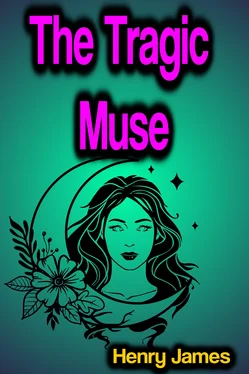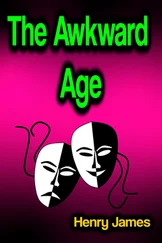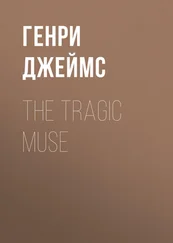The girl had got rid of her tears, and was gazing at her, and Mrs. Rooth leaned forward and said portentously: "She knows four languages."
Madame Carré gave one of her histrionic stares, throwing back her head. "That's three too many. The thing's to do something proper with one."
"We're very much in earnest," continued Mrs. Rooth, who spoke excellent French.
"I'm glad to hear it—il n'y a que ça. La tête est bien—the head's very good," she said as she looked at the girl. "But let us see, my dear child, what you've got in it!" The young lady was still powerless to speak; she opened her lips, but nothing came. With the failure of this effort she turned her deep sombre eyes to the three men. "Un beau regard—it carries well." Madame Carré further commented. But even as she spoke Miss Rooth's fine gaze was suffused again and the next moment she had definitely begun to weep. Nick Dormer sprung up; he felt embarrassed and intrusive—there was such an indelicacy in sitting there to watch a poor working-girl's struggle with timidity. There was a momentary confusion; Mrs. Rooth's tears were seen also to flow; Mr. Nash took it gaily, addressing, however, at the same time, the friendliest, most familiar encouragement to his companions, and Peter Sherringham offered to retire with Nick on the spot, should their presence incommode the young lady. But the agitation was over in a minute; Madame Carré motioned Mrs. Rooth out of her seat and took her place beside the girl, and Nash explained judiciously to the other men that she'd be worse should they leave her. Her mother begged them to remain, "so that there should be at least some English"; she spoke as if the old actress were an army of Frenchwomen. The young heroine of the occasion quickly came round, and Madame Carré, on the sofa beside her, held her hand and emitted a perfect music of reassurance. "The nerves, the nerves—they're half our affair. Have as many as you like, if you've got something else too. Voyons—do you know anything?"
"I know some pieces."
"Some pieces of the répertoire?"
Miriam Rooth stared as if she didn't understand. "I know some poetry."
"English, French, Italian, German," said her mother.
Madame Carré gave Mrs. Rooth a look which expressed irritation at the recurrence of this announcement. "Does she wish to act in all those tongues? The phrase-book isn't the comedy!"
"It's only to show you how she has been educated."
"Ah, chère madame, there's no education that matters! I mean save the right one. Your daughter must have a particular form of speech, like me, like ces messieurs."
"You see if I can speak French," said the girl, smiling dimly at her hostess. She appeared now almost to have collected herself.
"You speak it in perfection."
"And English just as well," said Miss Rooth.
"You oughtn't to be an actress—you ought to be a governess."
"Oh don't tell us that: it's to escape from that!" pleaded Mrs. Rooth.
"I'm very sure your daughter will escape from that," Peter Sherringham was moved to interpose.
"Oh if you could help her!" said the lady with a world of longing.
"She has certainly all the qualities that strike the eye," Peter returned.
"You're most kind, sir!" Mrs. Rooth declared, elegantly draping herself.
"She knows Célimène; I've heard her do Célimène," Gabriel Nash said to Madame Carré".
"And she knows Juliet, she knows Lady Macbeth and Cleopatra," added Mrs. Rooth.
"Voyons, my dear child, do you wish to work for the French stage or for the English?" the old actress demanded.
"Ours would have sore need of you, Miss Rooth," Sherringham gallantly threw off.
"Could you speak to any one in London—could you introduce her?" her mother eagerly asked.
"Dear madam, I must hear her first, and hear what Madame Carré says."
"She has a voice of rare beauty, and I understand voices," said Mrs. Rooth.
"Ah then if she has intelligence she has every gift."
"She has a most poetic mind," the old lady went on.
"I should like to paint her portrait; she's made for that," Nick Dormer ventured to observe to Mrs. Rooth; partly because struck with the girl's suitability for sitting, partly to mitigate the crudity of inexpressive spectatorship.
"So all the artists say. I've had three or four heads of her, if you would like to see them: she has been done in several styles. If you were to do her I'm sure it would make her celebrated."
"And me too," Nick easily laughed.
"It would indeed—a member of Parliament!" Nash declared.
"Ah, I have the honour——?" murmured Mrs. Rooth, looking gratified and mystified.
Nick explained that she had no honour at all, and meanwhile Madame Carré had been questioning the girl "Chère madame, I can do nothing with your daughter: she knows too much!" she broke out. "It's a pity, because I like to catch them wild."
"Oh she's wild enough, if that's all! And that's the very point, the question of where to try," Mrs. Rooth went on. "Into what do I launch her—upon what dangerous stormy sea? I've thought of it so anxiously."
"Try here—try the French public: they're so much the most serious," said Gabriel Nash.
"Ah no, try the English: there's such a rare opening!" Sherringham urged in quick opposition.
"Oh it isn't the public, dear gentlemen. It's the private side, the other people—it's the life, it's the moral atmosphere."
"Je ne connais qu'une scène,—la nôtre," Madame Carré declared. "I'm assured by every one who knows that there's no other."
"Very correctly assured," said Mr. Nash. "The theatre in our countries is puerile and barbarous."
"There's something to be done for it, and perhaps mademoiselle's the person to do it," Sherringham contentiously suggested.
"Ah but, en attendant, what can it do for her?" Madame Carré asked.
"Well, anything I can help to bring about," said Peter Sherringham, more and more struck with the girl's rich type. Miriam Rooth sat in silence while this discussion went on, looking from one speaker to the other with a strange dependent candour.
"Ah, if your part's marked out I congratulate you, mademoiselle!"—and the old actress underlined the words as she had often underlined others on the stage. She smiled with large permissiveness on the young aspirant, who appeared not to understand her. Her tone penetrated, however, to certain depths in the mother's nature, adding another stir to agitated waters.
"I feel the responsibility of what she shall find in the life, the standards, of the theatre," Mrs. Rooth explained. "Where is the purest tone—where are the highest standards? That's what I ask," the good lady continued with a misguided intensity which elicited a peal of unceremonious but sociable laughter from Gabriel Nash.
"The purest tone—qu'est-ce que c'est que ça?" Madame Carré demanded in the finest manner of modern comedy.
"We're very, very respectable," Mrs. Rooth went on, but now smiling and achieving lightness too.
"What I want is to place my daughter where the conduct—and the picture of conduct in which she should take part—wouldn't be quite absolutely dreadful. Now, chère madame, how about all that; how about conduct in the French theatre—all the things she should see, the things she should hear, the things she should learn?"
Her hostess took it, as Sherringham felt, de très-haut. "I don't think I know what you're talking about. They're the things she may see and hear and learn everywhere; only they're better done, they're better said, above all they're better taught. The only conduct that concerns an, actress, it seems to me, is her own, and the only way for her to behave herself is not to be a helpless stick. I know no other conduct."
"But there are characters, there are situations, which I don't think I should like to see her undertake."
Читать дальше












